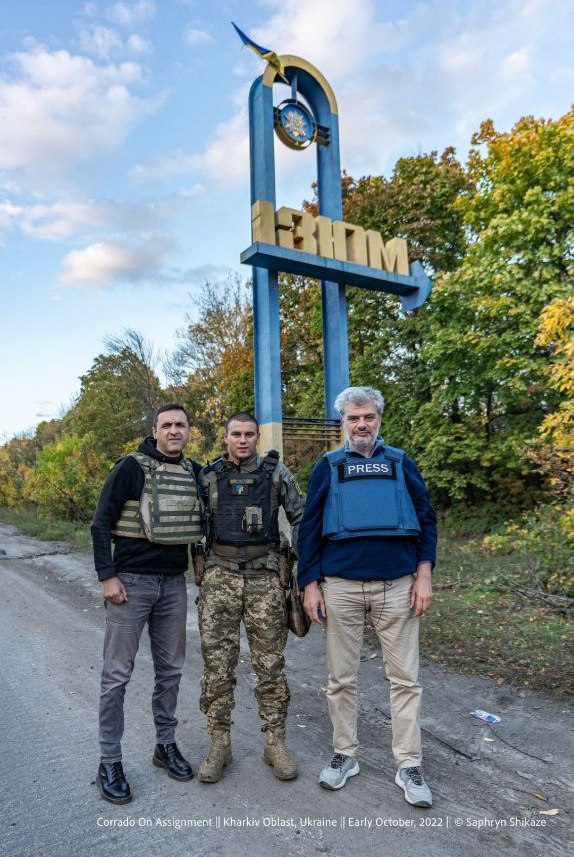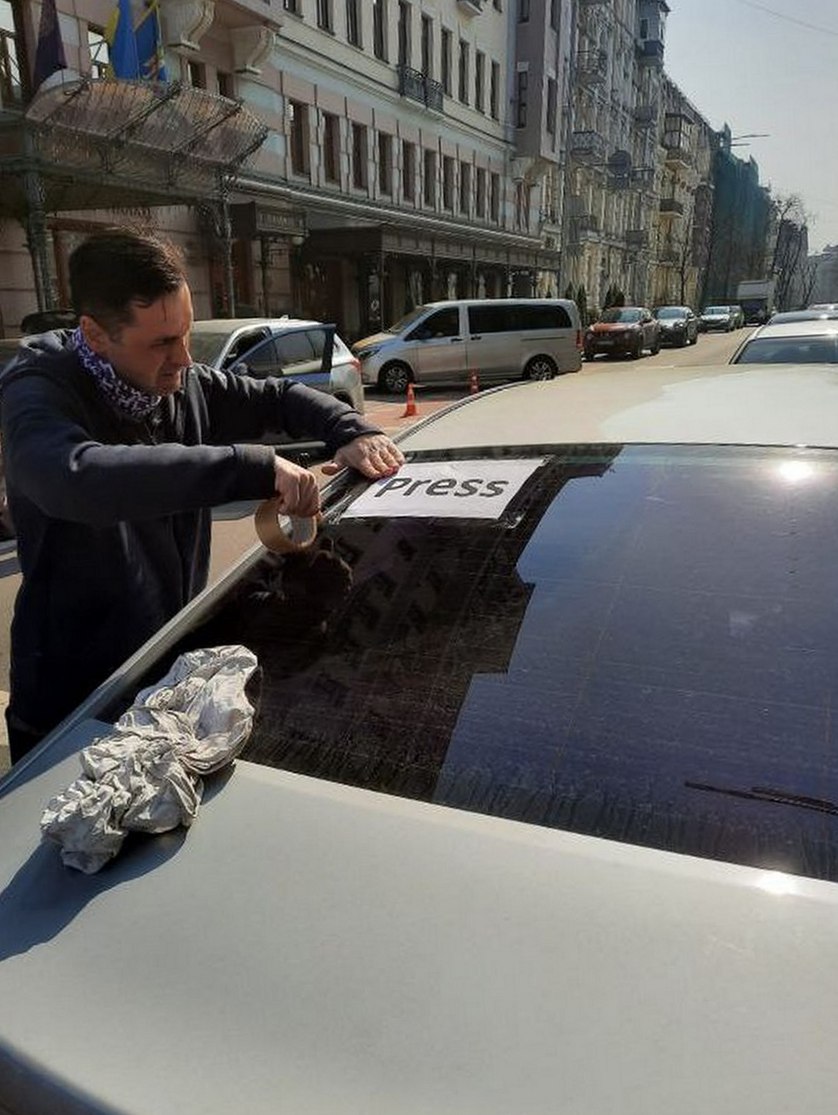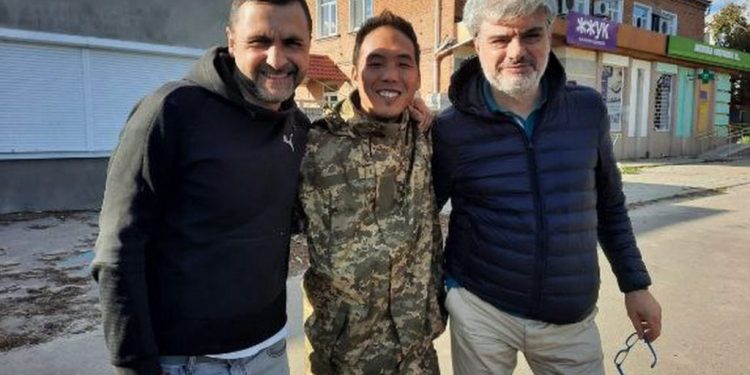He came to Ukraine shortly before the war after twenty-one years spent in Indonesia. He volunteered, delivering lunches to Ukrainian soldiers who defended Kyiv last spring. He helped foreign journalists who came to Ukraine to cover the events of the war. He was killed in Kherson by a Russian bullet piercing a blue vest with the inscription ‘Press,’ passed through his body and wounded an Italian newspaperman nearby… Pages from an interesting, unusual book on the life of Bohdan Bitik – a book that, unfortunately, has a tragic ending.
“He was a very talented person. He spoke English, Chinese, Indonesian, and Vietnamese. He was always ready to help… He had many friends – not only in Ukraine but worldwide. Today, our family is in deep sorrow, especially the mother… Like every Jewish mother, she is very close to her children…,” Bohdan‘s brother, Borys Bitik, told the press service of the National Union of Journalists of Ukraine (NUJU). “Bohdan and I, our sons, are her entire family, everyone she has…”
Kyiv resident Bohdan Bitik was born on January 12, 1977. He was a linguist who studied Eastern languages at Taras Shevchenko National University of Kyiv. He taught at Xiamen University in China. There he met his future wife, Indonesian Chinese Erlia. The couple has a 21-year-old son, Oleksandr, who studies and works in his native Indonesia.
After moving to his wife’s homeland, Bohdan started a business: to produce rattan furniture. Later, it became a family business of the Bitik family, and by 2010 the family had become the largest rattan furniture supplier in Ukraine.
“In the same 2010, Bohdan received an Indonesian state award for helping to save several Ukrainian women from sexual slavery. They came to Indonesia to work as models and fell into the hands of the mafia from a former Soviet country. They were forced to provide sexual services. Ukrainian relatives started looking for the girls and turned to the Ukrainian police, which turned to Interpol. A classmate of our late father worked for Interpol, and he asked for help. There were only a few citizens of Ukraine in Indonesia at that time. Bohdan almost single-handedly found the girls and brought them out of slavery, helped them return to their homeland,” said Borys Bitik.
Recently, the furniture produced by Bohdan‘s company began to sell worse. The man changed the direction of his activity and began working in Vietnam as a kitesurfing instructor – a sea sport, riding a board that moves thanks to the power of a kite…
When it became apparent that the war was about to start in Ukraine, Bohdan came to the Motherland. The war caught him here. Bohdan‘s brother Borys worked as a chef in a country club near Pukhivka, Kyiv Region, and during the defense of Kyiv, he prepared food for soldiers. Bohdan helped deliver lunches to checkpoints. Then military men he knew asked him to drive the car from Lviv to Kyiv. Bohdan went to Lviv and met foreign journalists there.
In the first weeks of the war, the profession of a fixer, a local assistant to foreign journalists, rapidly gained relevance. Bohdan perfectly suited the job as a person who spoke many languages and knew English perfectly.
“Almost immediately, Bohdan met the reporter of the Italian La Repubblica, Corrado Zunino. He made a number of trips to the front with him. He also accompanied one of the Japanese journalists. They left for several days, for a week. They were near Kherson, Izium, and Bakhmut,” says Borys Bitik. “But, the sixth trip was fatal for Bohdan….”

Borys Bitik says that he does not understand how it happened that Bohdan was on that trip without a bulletproof vest.
“He always stopped by my soldier friend in the unit and took equipment, a bulletproof vest, a helmet… I can’t even get why he was without the equipment on that day,” says Borys.
This is how Corrado Zunino, who Bohdan accompanied, describes the events of the fateful April 26, 2023:
“The situation in the city of Kherson was quite calm; I heard two or three shots far away, on the opposite bank of the Dnieper River controlled by the Russians. So, we got to the (Antonivskyi, – Ed.) bridge…,” the journalist said.
Leaving the car, he and Bohdan set off on foot.
“We left. The Ukrainian military started to shout at us: ‘Go away!’ We immediately left,” Zunino recalls. “I heard that they said ‘Press.’ While I was behind, Bohdan was still standing with his chest facing the Russian side. At that moment, I heard a hissing sound and what I can define as a burning sensation on my shoulder. And I saw how Bohdan fell to the ground.”
The sniper’s bullet went through Bohdan’s body, through his lungs, and hit Corrado.
“I have a photo of Bohdan lying on the bridge in a blue vest with the inscription ‘Press.’ The Russians definitely saw that they were shooting at media representatives,’ says Borys. ‘At least it was clear that they were civilians because there were no signs of military clothing on them. Senseless, senseless death. A great loss for our family and Bohdan‘s friends.

Bohdan Bitik was buried in the village of Pukhivka in the Kyiv Region.
“The murder of Ukrainian producer Bohdan Bitik and the wounding of Italian journalist Corrado Zunino during their journalistic work in Kherson is another Russian war crime. And it is also evidence of the danger of our profession,” wrote NUJU President Sergiy Tomilenko. “Deep condolences to the family and relatives of Bohdan, wishes for the recovery of Corrado Zunino.”
Maksym Stepanov, NUJU information service
Photo by Borys Bitik

 THE NATIONAL UNION OF
JOURNALISTS OF UKRAINE
THE NATIONAL UNION OF
JOURNALISTS OF UKRAINE
















Discussion about this post